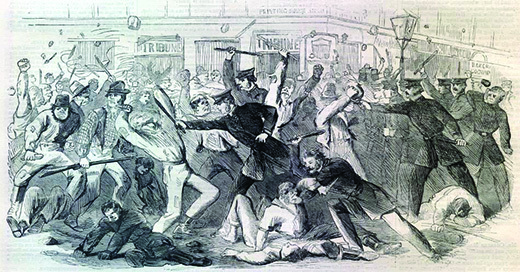| << Chapter < Page | Chapter >> Page > |
Read through the full text of the Emancipation Proclamation at the National Archives website.
The proclamation generated quick and dramatic reactions. The news created euphoria among slaves, as it signaled the eventual end of their bondage. Predictably, Confederate leaders raged against the proclamation, reinforcing their commitment to fight to maintain slavery, the foundation of the Confederacy. In the North, opinions split widely on the issue. Abolitionists praised Lincoln’s actions, which they saw as the fulfillment of their long campaign to strike down an immoral institution. But other Northerners, especially Irish, working-class, urban dwellers loyal to the Democratic Party and others with racist beliefs, hated the new goal of emancipation and found the idea of freed slaves repugnant. At its core, much of this racism had an economic foundation: Many Northerners feared competing with emancipated slaves for scarce jobs.
In New York City, the Emancipation Proclamation, combined with unhappiness over the Union draft, which began in March 1863, fanned the flames of white racism. Many New Yorkers supported the Confederacy for business reasons, and, in 1861, the city’s mayor actually suggested that New York City leave the Union. On July 13, 1863, two days after the first draft lottery took place, this racial hatred erupted into violence. A volunteer fire company whose commander had been drafted initiated a riot, and the violence spread quickly across the city. The rioters chose targets associated either with the Union army or with African Americans. An armory was destroyed, as was a Brooks Brothers’ store, which supplied uniforms to the army. White mobs attacked and killed black New Yorkers and destroyed an African American orphanage ( [link] ). On the fourth day of the riots, federal troops dispatched by Lincoln arrived in the city and ended the violence. Millions of dollars in property had been destroyed. More than one hundred people died, approximately one thousand were left injured, and about one-fifth of the city’s African American population fled New York in fear.

The war in the west continued in favor of the North in 1863. At the start of the year, Union forces controlled much of the Mississippi River. In the spring and summer of 1862, they had captured New Orleans—the most important port in the Confederacy, through which cotton harvested from all the Southern states was exported—and Memphis. Grant had then attempted to capture Vicksburg, Mississippi, a commercial center on the bluffs above the Mississippi River. Once Vicksburg fell, the Union would have won complete control over the river. A military bombardment that summer failed to force a Confederate surrender. An assault by land forces also failed in December 1862.
In April 1863, the Union began a final attempt to capture Vicksburg. On July 3, after more than a month of a Union siege, during which Vicksburg’s residents hid in caves to protect themselves from the bombardment and ate their pets to stay alive, Grant finally achieved his objective. The trapped Confederate forces surrendered. The Union had succeeded in capturing Vicksburg and splitting the Confederacy ( [link] ). This victory inflicted a serious blow to the Southern war effort.

Notification Switch
Would you like to follow the 'U.s. history' conversation and receive update notifications?